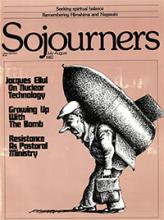Recently I was invited to address a group of 50 top military officers on the subject, "A Christian View of Nuclear War." In preparation for the event I sought advice from a Catholic theologian who has had extensive contact with military leaders. I asked him what motivates them. Is it economic self-interest? Personal ambition? Professional advancement? Political power? Patriotism?
Without hesitation he answered that the primary motivation of most of the top military leaders he knew was religious. He said they believe they are defending the values of God against the anti-God. America is defending Christianity against godless atheism.
At first I was stunned. But on reflection, it made a lot of sense. Military leaders are trained and prepared to fight nuclear war. Something so total and horrible could not be fought for anything less than religious reasons. The pursuit of political power, economic gain, or national self-interest would not be sufficient to wage a nuclear war. We could only feel justified in destroying the world if we believed that the most ultimate of values were indeed at stake.
I reflected on how biblically predictable it all is. The anti-Christ always comes in the guise of Christ. He is the inversion of the true Christ and uses religious language for his own justification. Nuclear war would be the most godless act committed in history, done in the name of God.
John Lehman, Secretary of the Navy, justified the naming of a nuclear attack submarine "Corpus Christi," which means "Body of Christ." Said Lehman, "My religious beliefs provide vital inspiration to my efforts;" and "America is the chief hope of Western Judeo-Christian civilization." He went on to justify American nuclear buildup in opposition to "a godless ideology."
Read the Full Article

